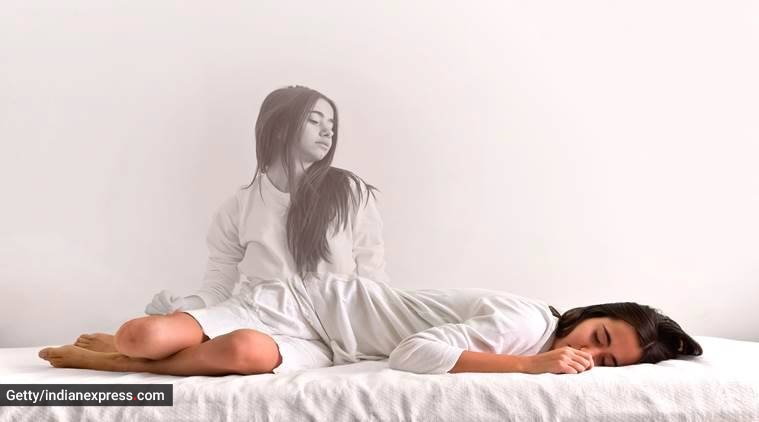📣 For more lifestyle news, click here to join our WhatsApp Channel and also follow us on Instagram
Sleep paralysis may last for a few seconds, but it can make people hear, feel, or see things that are not there
Some feel like they're being suffocated or strangled, while others feel like they're being dragged out of bed. Experts explain what causes this
 It is a phenomenon that is both fascinating and terrifying (Source: Getty Images/Thinkstock)
It is a phenomenon that is both fascinating and terrifying (Source: Getty Images/Thinkstock) Have you ever woken up in the middle of the night, unable to move your body? Have you ever felt like you were trapped in your own mind, unable to scream for help as a dark presence loomed over you? This is sleep paralysis, a phenomenon that is both fascinating and terrifying. “Sleep paralysis is a state lasting a few seconds to minutes during waking up or falling asleep, in which one is conscious but unable to move or speak. This may be associated with hallucinations when one may hear, feel, or see things that are not there,” Dr Krishnan P R, Senior Consultant, Neurology, Fortis Hospital, Bannerghatta Road, Bangalore said.
What makes sleep paralysis so intriguing is the range of experiences that people report during episodes. Some feel like they’re being suffocated or strangled, while others feel like they’re being dragged out of bed. Some people see hallucinations of dark figures or monsters in the room, while others report feeling a weight on their chest or a presence sitting on top of them. It’s like being trapped in a surreal nightmare, where the rules of reality are distorted and the veil between the conscious and unconscious worlds is lifted.
Talking about the same, Dr Ambarish Joshi, Senior Consultant, Pulmonary and Sleep Medicine, Primus Super Speciality Hospital said, “It typically occurs as a person falls asleep or wakes up, during which the brain is still in a state of sleep and the muscles remain relaxed. This temporary paralysis can be accompanied by vivid hallucinations, a sense of pressure on the chest, and feelings of fear or dread. While it is a relatively common occurrence, sleep paralysis can be distressing for those who experience it.”
The experts shared that the common symptoms of sleep paralysis include a temporary inability to move or speak, which can be accompanied by feelings of fear, dread, or anxiety. “Many people also report a sense of pressure or weight on their chest, making it difficult to breathe normally. In addition, sleep paralysis can be associated with vivid hallucinations, which can be extremely realistic and often involve the perception of a threatening presence in the room. These symptoms can be distressing and lead to significant sleep disruption and impairment of daily functioning,” Dr Joshi said.
 What makes sleep paralysis so intriguing is the range of experiences that people report during episodes. (Source: Getty Images/Thinkstock)
What makes sleep paralysis so intriguing is the range of experiences that people report during episodes. (Source: Getty Images/Thinkstock)
But, what causes sleep paralysis? The exact reason is not fully understood, experts say. However, Dr Krishnan shared that it has been linked with:
*Insomnia
*Disrupted sleeping patterns – for example, because of shift work or jet lag
*Narcolepsy – a long-term condition that causes a person to suddenly fall asleep
*Post-traumatic stress disorder (PTSD)
*Generalised anxiety disorder
*Panic disorder
*A family history of sleep paralysis (genetic causes)
Obstructive Sleep Apnea (OSA) may also be behind sleep paralysis, said Dr (Lt Gen) CS Narayanan Vsm, HOD And Consultant, Department Of Neurology, HCMCT Manipal Hospital, Dwarka “In OSA, a person snores a lot because the respiratory passages/breathing tract gets blocked at night while sleeping. In this case, the person experiences excessive daytime sleepiness.”
To manage this condition, you can incorporate several lifestyle changes, including maintaining a regular sleep schedule, improving sleep hygiene, and reducing stress and anxiety. Dr Narayanan said, “To manage the condition, it is important to identify it using overnight sleep study, also known as Polysomnography, that monitors the breathing rate and brain activity while the person is sleeping. Also, multiple sleep latency test (MSLT) measures how quickly a person can fall asleep. It identifies the ideal conditions to take a nap. People do not usually fall asleep instantly but people under these ideal conditions may be able to fall asleep almost instantly.”
Adding, Dr Joshi said, “Some strategies that may be helpful include practising relaxation techniques such as deep breathing or meditation, avoiding caffeine and other stimulants before bed, and avoiding sleeping on your back. In some cases, treating underlying medical or mental health conditions may also help to alleviate sleep paralysis symptoms. If sleep paralysis is causing significant distress or interfering with daily functioning, it is important to speak with a healthcare professional to discuss potential treatment options.”
Concluding, experts asked everyone to not ignore sleep paralysis because it can cause significant distress and interfere with a person’s ability to get restful sleep. “In general, sleep paralysis is not considered dangerous. But around 10 per cent of people with this disorder have more recurrent episodes and can develop negative thoughts about going to bed, reducing sleep duration, or provoking anxiety around bedtime, which makes it harder to fall asleep,” Dr Krishnan said.
(Next in the series: Do you feel an irresistible urge to move the legs while sleeping?)
📣 For more lifestyle news, follow us on Instagram | Twitter | Facebook and don’t miss out on the latest updates!
📣 For more lifestyle news, click here to join our WhatsApp Channel and also follow us on Instagram





- 01
- 02
- 03
- 04
- 05






















